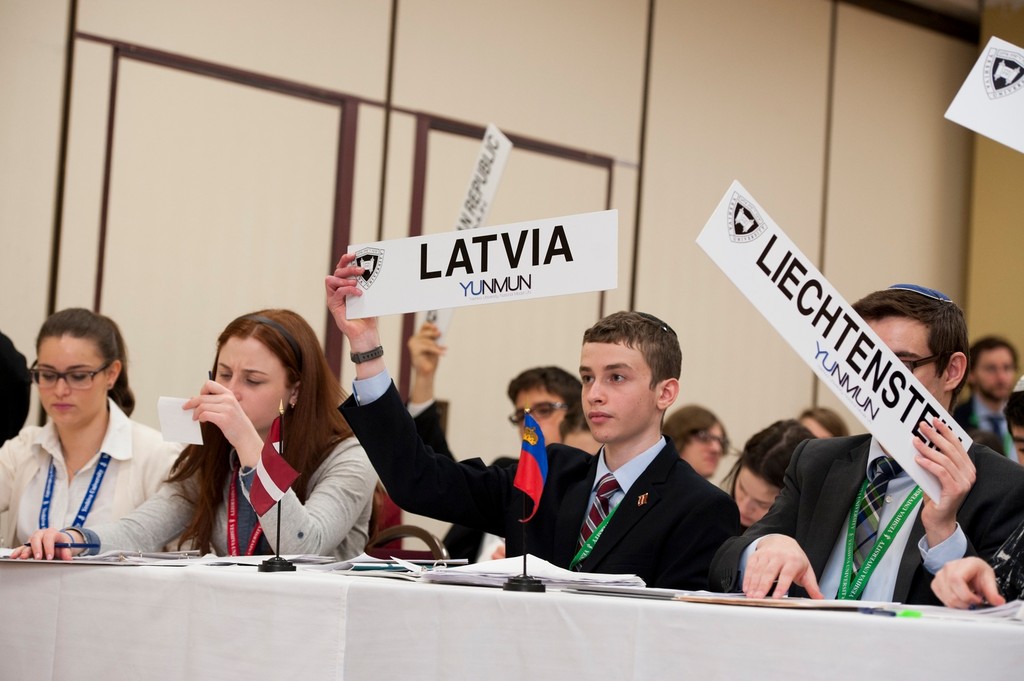Teens tackle global issues at YU model UN
STAMFORD, Conn.—The United Nations is in session. Sam Collins, Croatian delegate to the World Intellectual Property Organization, rises to address the debate on a topic currently occupying the Global Access to Knowledge Movement (A2K): Should free or low-cost smartphones be distributed to populations of developing countries?
He suggests, “Instead of giving them information, let us give them data; instead of giving them the halacha (Jewish law), we would give them the entire Gemara (Talmud).” Collins bolsters his argument further with a more pedestrian example: “Instead of giving them one ready-made slice of pizza, we give them all of the pizza ingredients and see what they create.”
Welcome to the 24th annual Yeshiva University National Model United Nations (YUNMUN) conference.
Collins, 17, was one of seven delegates from Robert M. Beren Academy, a modern Orthodox day school in Houston and one of 46 participating Jewish day schools from North America, Brazil, and South Africa. From Feb. 9-11, the Stamford Plaza Hotel and Conference Center in Stamford, Conn., was home to some 450 teen delegates, who debated and untangled the world’s most crushing problems, breaking only for regular mandatory minyanim, optional study sessions, and kosher mealtimes.
“The Gemara comparison fits into the context of YUNMUN by bringing a complicated intellectual subject and putting it into terms that can be understood by all,” says Laura Mitzner Paletz, a Beren alumna who has coached the Beren delegation with her husband, Steven Paletz, for three years.
The Paletzes’ involvement in YUNMUN goes back to their high-school days, when Steven was a member of the Yeshiva University of Los Angeles High School delegation in 2010 and 2011. Theirs is not an unusual story at this student-run conference. Many committee chairs, all YU students, first came to the event as high-school delegates.
Schools prepare for six months, applying in September and receive country assignments in November. The committees and debate topics are posted online in December, and each delegation must submit a position paper for each committee their members will serve on, before YUNMUN opens.
For the four delegates from Colégio Iavne in Sao Paolo, Brazil, the selection process began with a high score on the Bechina Yerushalmit, an international Judaic and Hebrew course of study designed by the Jewish Agency for Israel and Hebrew University of Jerusalem. The students work with teachers on writing their position papers and presenting their points in English, and are coached by former YUNMUN participants.
This is the fourth year Iavne has fielded a delegation, after hosting a group of YU students who gave a presentation on the university at the day school. “We want our students to get exposure to the environment of YU and to other modern Orthodox Jews around America,” says Rabbi Saul Paves, Iavne’s principal of Jewish studies and the delegation’s faculty advisor.
As a recruitment tool for YU, YUNMUN is run by the university’s admissions department and is heavily underwritten by the school. “These kinds of events are meant to entice kids to seek admission to these universities,” says Kathy Sklar, a 23-year veteran faculty advisor from Akiva Hebrew Day School in Detroit.
“We are one of YU’s feeder schools; all my senior applicants get admitted and a percentage always goes. YUNMUN offers so much intensity and value to these students—learning to understand and debate issues, being part of a political process, and there’s a strong social aspect as well. They have a great time and they take this very seriously.”
Indeed, Zharnest says that YU sets up the event to reflect the university’s “Torah U-Madda (Torah and secular knowledge) flavor,” from the decorations to the optional shiurim (Torah lessons) to the kosher food, to the committee chairs’ conduct. YUNMUN is the largest Orthodox Model UN, even though not all participating schools are Orthodox.
“Everybody gets along, nobody is disrespectful, the students look at each other as the countries they’re representing and are friendly to each other,” Zharnest says. “We don’t force religion, but we don’t want anybody to feel uncomfortable—as long as they follow the basic dress code.”
On Sunday evening, as the teens prepared for two days as Croatian, Pakistani or Swedish diplomats, Secretary General Adena Kleiner (YU ’14) sent them off with an adult agenda. “Walk into your committee sessions knowing that what you gain can be used to change the world,” she said. “Recognize that your words and arguments have resonance beyond these walls. Most importantly, I challenge you not to underestimate yourselves. Begin to improve the world today.”
Kleiner’s words followed those of keynote speaker Rabbi Lord Jonathan Sacks, former chief rabbi of the United Kingdom, who holds a dual professorship at YU and New York University.
“I hope I will not be too controversial if I say that the UN has some room for improvement,” Sacks said. After a lifetime of forging multi-faith friendships both personal and political, Sacks can also tell the story of cooperation across differences.
Less than 48 hours later, each committee chair bestowed certificates for Best Delegate, and First and Second Honorable Mention.
Three schools took home the top prizes for Best Delegation: SAR Academy in Riverdale, NY; Maimonides School in Brookline, Mass.; and Melvin J. Berman Hebrew Academy in Baltimore.

 51.0°,
Overcast
51.0°,
Overcast 




